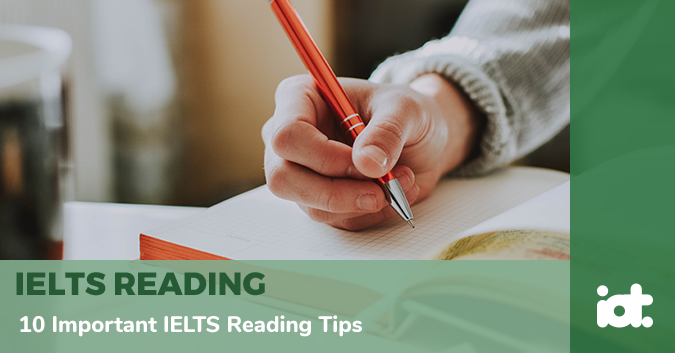
10 Important IELTS Reading Tips
Every candidate feels that the IELTS Reading test is tough and they have a very short amount of time to answer a large number of questions on very complicated texts. You need to master the reading skills to get a 7 Band Score or higher and have a range of strategies prepared in order to tackle it. Here are some tips:
1. Read a lot of Academic texts
Develop a habit of reading in your free time! The IELTS texts are “general academic texts”. This implies that they are obtained from sources such as textbooks and specialist magazines and journals. In case you are not familiar with reading such kind of texts in English then you need to start reading them so that you become familiar with the words and language also with the structure used when you meet them in the exam. The three typical sources for IELTS Reading texts are the National Geographic, the New Scientist and the Economist.
2. Focus
Your focus should be on the text first, then on the questions! Only if you have a good understanding of the text, you can answer the questions more precisely and effectively.
3. Be able to Categorize
IELTS exam writers select a range of specific type of texts. You need to learn to recognize the type of text you are reading. It will help you predict its structure and you will be able to understand it more quickly. There are four types of IELTS Reading texts – A) analytic texts that will discuss the reasons why something happened or make recommendations or explain a concept B) descriptive texts that describe a situation, explain how something is done or categorize something C) discursive texts in which different opinions are expressed about an issue and D) narrative texts that explain a chronological sequence of events.
4. Skimming
Develop the ability to skim. Skimming means to read quickly by skipping the unimportant words like prepositions and ignoring the difficult words that you don’t have to understand. You should do this to get a general idea about a text or a paragraph or while intensively searching for the answer of a question.
5. Scanning
You must learn to scan. Scanning is exactly what you do when you look for a price in advertising text or a name in a telephone book. While scanning you do not actually need to read the text but move your eyes quickly over it. You can scan either left to right or right to left, from top to bottom or bottom to top. You should do this to find out the location of answers in the texts looking out for easy to spot words like numbers, dates and words beginning with capital letters such as place names.
6. Structure
Learn to recognize paragraph structure. This involves spotting the relationship between main ideas and supporting ideas in a paragraph. Paragraphs are mostly descending i.e., they start with the main idea somewhere near the start and develop from there, however some, frequently first and the last paragraphs of the texts, are ascending – the main idea is found to be located towards the end. This can prove to be helpful particularly when matching the headings to the paragraphs.
7. Overview
Get the overview of a text before beginning with the questions. Do this by reading the title and the subtitle as well as focusing on the beginnings and ends of paragraphs. This will help you process the information in a text.
8. Similar phrases
Develop the skill to spot similar phrases. There are different ways of expressing the same thing, such as, “I like to ski” and “skiing is enjoyable”. Many questions, for example, YES NO NOT GIVEN questions and gap fills, test your ability to match up a parallel phrase in the task with its equivalent in the text.
9. Stop panicking
Don’t panic when you face an unknown or difficult word. IELTS texts are packed with highly specialized vocabulary and therefore you are advised to read relevant texts beforehand to prepare. Skip over difficult words which are unnecessary for your understanding of the text. For words you need to understand, practice trying to guess their meaning using the overall context of the text.
10. Time management
Manage time in the exam. Most of the IELTS candidates complain about running out of time in the third reading section. Each text should take you about 20 minutes (the examiner will bring it to your notice when 20 minutes have passed). Never spend too long on a single question – either guess the answer if you don’t know the answer exactly or skip the question and return to it later. Also, if you feel you are running out of time, tackle questions like gap fills before attempting “easy-to-guess” tasks.




